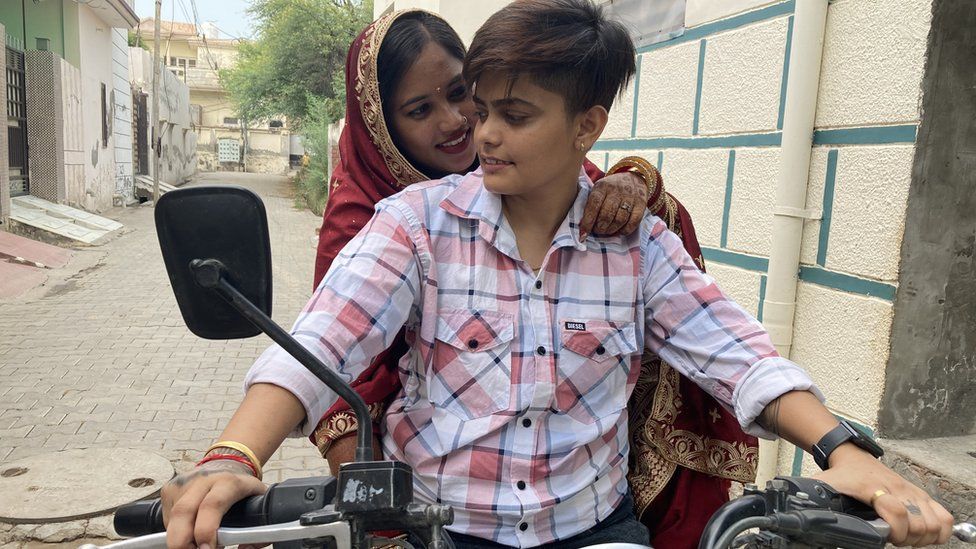While India waits for the Supreme Court’s verdict on legalising same-sex marriage, an LGBTQ couple’s recent wedding in the northern state of Punjab has made headlines – and also created controversy.
Dimple, 27 – who uses the pronoun he – and Manisha, 21, married in Bathinda city on 18 September with the blessings of their families – something that’s highly unusual in a conservative country like India.
But what was even more unusual was that their marriage was solemnised in a gurdwara – a Sikh temple – with the bride and groom performing all traditional rituals.
The wedding has been criticised by some religious leaders, including Sikhism’s highest priest Giani Raghbir Singh who declared that “same-sex marriage was unnatural and contrary to Sikh ethics”.
The marriage of two women in the presence of Guru Granth Sahib – the holy Sikh scripture – was “a severe moral and religious violation”, he said, and instructed the Bathinda gurdwara committee to suspend priest Hardev Singh, who conducted the marriage, and three others from their duties until further notice.
Hardev Singh has since been removed from his position. In his defence, he said that he couldn’t figure out that both the bride and the groom were female as one of the women was wearing a turban.
Dimple has questioned the claim, saying that they had provided copies of their identity proof to the gurdwara so there was no reason for confusion.
Dimple is from Mansa district while Manisha is from Bathinda – both are remote areas where LGBTQ+ rights are rarely ever discussed in public. Dimple, an upper-caste Jatt Sikh, and Manisha, a Dalit Hindu, met at a garment factory in Zirakpur, a town near Punjab’s capital Chandigarh, where they both worked.
When I met them a few days after their wedding, they looked like any happy newly-wed couple. The couple told me that their Anand Karaj (or Sikh wedding ceremony) was attended by nearly 70 relatives.

In their wedding photographs and videos, Dimple appears dressed as a traditional Sikh groom with the customary garland of flowers tied to his maroon turban, while his bride Manisha is wearing a maroon and gold tunic, salwar bottoms and a silk scarf and both her arms are covered with red bangles.
Dimple, who mostly dresses in a shirt and trousers and keeps his hair short, says when he told his parents that he had no interest in boys, they understood and “extended their support, expressing joy in his happiness”.
An only child, he once contemplated gender reassignment surgery and even consulted a doctor, but decided against it as his parents were concerned about the procedure’s outcomes.
It was in 2017 after he moved to Zirakpur for work that he became more aware of LGBTQ+ issues. “There, I met like-minded friends who understood my situation and I also gained awareness from YouTube,” he says.
- Historic India same sex marriage hearing enters day two
- ‘My parents were ready to kill me for their honour’
Manisha, says Dimple, wasn’t his first love. “I was in a relationship with a girl for five years. Earlier this year, we broke up. Then I dated another girl for three-four months, but that also didn’t work out.”
Manisha, who was then a co-worker and a friend, often helped him resolve his differences with his girlfriend.
“That’s when I realised that Manisha could be a better partner for me. She also enjoyed my company, we grew closer and had long chats. So, we officially became a couple a month ago,” says Dimple.
Manisha says he proposed to her over the phone just three or four days after they began their relationship, adding that she readily accepted. “A women needs a life partner who understands her, respects her, showers her with love, and treats her like a child.”
But it did take some effort to convince her parents that she wanted to marry Dimple.
“My mother told me it’s not possible to marry a girl. Eventually, I convinced her that if she wanted my happiness, then she had to let me marry who I wanted. Once she agreed, she also persuaded my father.”

Their parents then met and the wedding date was finalised. As Dimple is a practising Sikh, his parents say he wanted to marry following Sikh rituals so they approached the gurdwara priest.
The couple insist that they never hid their identities and show the marriage certificate Bathinda gurdwara committee has issued them.
India decriminalised gay sex in 2018, but same-sex marriages still lack official recognition. The Supreme Court recently heard a slew of petitions seeking marriage equality and judgement is due soon.
So at the moment, a same-sex marriage is not legal in India which means that Dimple and Manisha cannot access rights enjoyed by heterosexual married couples, but at the same time, experts say it is not considered a felony.
But the Shiromani Gurdwara Prabandhak Committee, the apex religious body of Sikhism says it is investigating if there have been any violations of religious codes.
BBC News India is now on YouTube. Click here to subscribe and watch our documentaries, explainers and features.

Read more India stories from the BBC:
- Hopes dim as India awaits signal from Moon lander
- Why an American comic book evokes nostalgia in Indians
- Incendiary rhetoric on Sikh murder stirs debate in Canada
- India reserves third of MP seats for women – eventually
- India-China border row flares over athlete visas
- Trudeau repeats allegation against India amid row

